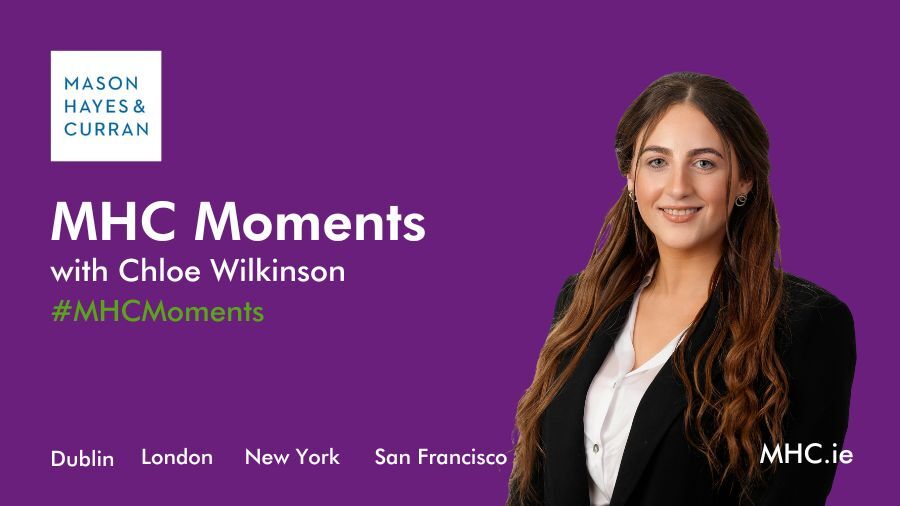MHC Moments with Chloe Wilkinson

Welcome to the next edition of MHC Moments. In this series, we shine a spotlight on the contributions our people make to our community and the experiences that make us who we are.
To mark Pro Bono Week Ireland, our colleague Chloe Wilkinson shares her experiences of volunteering with Mercy Law Resource Centre.
Tell us about a volunteering project that you have worked on.
Mercy Law is an independent law centre and registered charity. They provide legal advice and support to individuals regarding queries related to social housing and homelessness.
The firm partnered with Mercy Law from mid-June of 2023. Once this volunteering opportunity arose, I immediately signed up. To date, I’ve been working with Mercy Law for about a year. Prior to my involvement with Mercy Law, I volunteered throughout my university years through the Raise and Give Society and through other educational initiatives for children in the local community.
It’s up to each volunteer to decide how many clinics to take on. The rota runs for six months, during which we divide the clinics among ourselves. I usually take on five clinics and also volunteer as a substitute if the primary volunteer for a given week is unable to cover the clinic. Each clinic involves three or four clients. The clinics are remote and take place every Thursday afternoon from 2 to 3:30pm, depending on the number of clients and the complexity of the cases.
Details of the clients and their queries are circulated the day before, which allows you to prepare in advance. The most common queries that have come across my desk involve:
- Priority of social housing (i.e. duration of time spent on housing lists)
- Succession of social tenancies
- Medical priority
- Refusing an offer
What do you find most rewarding?
The part I find most rewarding from volunteering with Mercy Law is empowering the clients and assisting them in formulating a plan in progressing their housing application / circumstance.
It’s also very rewarding to hear how simply listening to a person's circumstances and showing empathy to their situation can, in and of itself, really make a difference to their state of mind.
Did you encounter any challenges?
Unfortunately, not every case is straightforward. Similarly, in other instances, it may be the case that nothing can be done at that point in time. This is because of the extent of Ireland’s housing crisis, and resource constraints.
For example, take the case of a 38-year-old in perfect health who has been on the housing list for a long time and is living in an overcrowded home. In these circumstances, unless there is a breach of fair procedures, the individual will most likely have to remain in their current situation and continue waiting.
How do you balance your work responsibilities with your volunteer commitments?
Volunteering requires being organised. I balance my work responsibilities with my volunteer commitments by factoring my volunteering commitment into my working plan for that week. Mercy Law is noted as a ‘to do’ item on my list and it’s flagged during my workflow capacity calls that week. This allows me to stay on track and not under deliver in respect of either commitment.
Explore Our Pro Bono Activities
Are there any specific skills that you have developed through your volunteering experience?
I’ve further developed my soft skills from volunteering with Mercy. Specifically, listening. It’s very important to listen during the phone clinics as in some cases, issues which are recorded in the notes and shared the day before, are not in fact relevant. This means you must carefully listen to the client and take notes of their circumstances, thinking on the spot – identifying the ‘real’ issue(s) as this will then inform you as to what is the appropriate course of action. It’s also important to listen to the client so that you can empathise and demonstrate compassion for their case. In most cases, the clients are extremely vulnerable and distressed. This requires volunteers to be effective listeners so that they can handle the clinics with care and upmost respect.
I would also say my communication skills have further improved as a result of my volunteering work. Mercy Law clients, akin to my commercial clients, aren’t particularly interested in the ‘law’ on housing nor are they interested in each County Council’s set of rules. Instead, they want to understand the practical implications of these rules for their individual circumstances. The firm already uses plain English in our communications and we avoid legal jargon. However, this specific volunteering experience has allowed me to further develop my ability to deliver pragmatic advice compassionately.
What advice would you give to other staff members who are considering getting involved in volunteering?
Volunteering with a group like Mercy Law means you are playing a proactive role in helping those impacted by Ireland’s housing crisis. As previously mentioned, the time commitment can be as little or as much as you like, but the reward is ten-fold. Despite how busy I am with my commercial clients, I always stick to my volunteering commitment as it provides a great sense of perspective. The work Mercy Law does is miraculous. I am delighted to be assisting with their workload. I think all lawyers should be involved in pro bono work as we are able to give back, enabling individuals to access justice who cannot afford their own legal counsel.
When it comes to Corporate Social Responsibility, we see it as a natural fit with the way we do business. Find out more about our pro bono work and our other Corporate Social Responsibility initiatives.
Share this:

